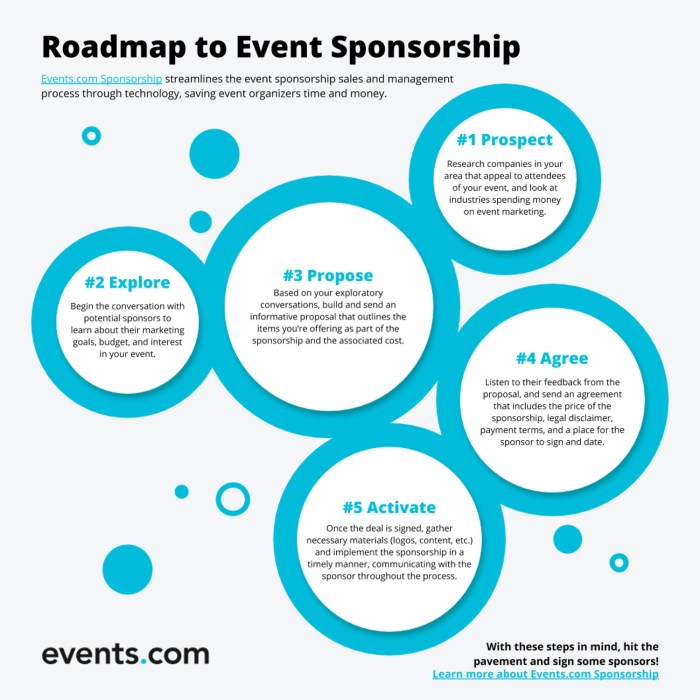Event Sponsorship Tips sets the stage for this enthralling narrative, offering readers a glimpse into a story that is rich in detail with american high school hip style and brimming with originality from the outset.
Event sponsorship plays a vital role in the success of any event, from securing funding to enhancing the overall experience. Let’s dive into the world of event sponsorship and uncover the key tips for making your event a hit.
Importance of Event Sponsorship

Event sponsorship plays a crucial role in the success of any event. It not only provides financial support but also helps in enhancing the overall experience for attendees. By partnering with the right sponsors, events can reach a wider audience, increase brand visibility, and offer unique activations that elevate the event to a whole new level.
Funding and Enhancing Event Experience
Event sponsorship is essential for funding various aspects of an event such as venue rental, marketing, staff expenses, and entertainment. Sponsors can provide financial support or in-kind contributions that reduce the financial burden on event organizers. Moreover, sponsors can also enhance the event experience by offering exclusive VIP areas, product samples, interactive booths, or branded merchandise. This not only adds value to the event but also creates memorable experiences for attendees.
Successful Examples of Event Sponsorships
– The Coachella Music Festival: Coachella has successfully partnered with brands like HP, Heineken, and American Express to create immersive experiences for festival-goers. From branded art installations to VIP lounges, these sponsorships have elevated the festival experience.
– Super Bowl Halftime Show: The Super Bowl halftime show is known for its extravagant performances, thanks to sponsorships from brands like Pepsi. These partnerships have allowed for iconic performances by some of the biggest names in music, making the halftime show a highly anticipated event.
Types of Event Sponsorship: Event Sponsorship Tips
When it comes to event sponsorship, there are various options available to choose from. Two common types include in-kind sponsorships and monetary sponsorships. Let’s dive deeper into these options and explore some creative ideas that go beyond the traditional approaches.
In-Kind Sponsorships vs. Monetary Sponsorships
In-Kind Sponsorships:
– In-kind sponsorships involve providing goods or services instead of direct financial support.
– Examples include providing catering services, event space, or products for giveaways.
– This type of sponsorship can help reduce costs for the event organizer and create unique opportunities for collaboration.
Monetary Sponsorships:
– Monetary sponsorships involve providing direct financial support to the event organizer.
– Sponsors may contribute funds to cover event expenses, marketing costs, or other financial needs.
– This type of sponsorship is more straightforward in terms of financial support but may not always offer the same level of creativity as in-kind sponsorships.
Creative Sponsorship Ideas
– Virtual Reality Experience: Partner with a tech company to create an interactive VR experience for attendees.
– Social Media Takeover: Allow a sponsor to take over your event’s social media accounts for a day to promote their brand.
– Branded Transportation: Partner with a transportation company to provide branded shuttles or vehicles for attendees.
– Interactive Installations: Create unique interactive installations sponsored by companies looking to engage with your audience in a memorable way.
Finding the Right Sponsors
To ensure a successful event sponsorship, it’s crucial to find sponsors that align with the values and target audience of your event. Here’s how you can identify potential sponsors that are the right fit and build strong partnerships:
Identifying Potential Sponsors
When looking for sponsors, consider companies or brands that share similar values or have a target audience that overlaps with yours. Research potential sponsors to understand their brand image, target demographics, and previous sponsorship history. Look for sponsors who have a track record of supporting events similar to yours.
Approaching Sponsors and Building Partnerships
Once you’ve identified potential sponsors, reach out to them with a personalized approach. Highlight how their brand can benefit from sponsoring your event and tailor your pitch to showcase the value they will receive in return. Build relationships with sponsors by offering unique opportunities for brand visibility and engagement at your event.
Tailoring Sponsorship Proposals
When creating sponsorship proposals, customize them to suit the specific needs and goals of each potential sponsor. Highlight how sponsoring your event can help them reach their marketing objectives, increase brand awareness, or connect with their target audience. Be clear about the benefits of sponsorship and how it aligns with the sponsor’s overall marketing strategy.
Negotiating Sponsorship Deals
When it comes to securing beneficial sponsorship agreements, negotiation tactics play a crucial role in determining the success of the deal. By understanding key strategies and approaches, event organizers can create mutually beneficial partnerships with sponsors.
Setting Clear Expectations and Deliverables
In sponsorship contracts, it is essential to set clear expectations and deliverables to ensure that both parties are on the same page. This includes outlining the specific benefits the sponsor will receive, such as logo placement, advertising opportunities, or speaking engagements. By clearly defining what each party expects from the partnership, potential misunderstandings can be avoided, leading to a more successful collaboration.
- Clearly Artikel the benefits and exposure the sponsor will receive in exchange for their support.
- Set realistic goals and objectives for the sponsorship deal to ensure both parties are working towards the same outcomes.
- Include details on timelines, deadlines, and any other important milestones to keep the partnership on track.
By establishing clear expectations and deliverables in sponsorship contracts, event organizers can ensure that both parties are satisfied with the partnership and the agreed-upon terms.
Creating Win-Win Situations
To negotiate successful sponsorship deals, it is crucial to create win-win situations for both the event organizer and the sponsor. This involves understanding the needs and goals of the sponsor and tailoring the partnership to meet those objectives while also benefiting the event.
- Identify the sponsor’s target audience and how the event can help them reach their marketing goals.
- Offer unique opportunities for the sponsor to engage with attendees and create memorable experiences.
- Provide data and insights on the event’s reach and impact to showcase the value of the partnership.
By focusing on creating mutually beneficial partnerships, event organizers can secure long-term sponsor relationships and maximize the value for both parties involved.
Leveraging Sponsorship Activation

To maximize sponsor exposure and engagement during an event, it’s crucial to implement effective sponsorship activation strategies. These strategies aim to create meaningful interactions between sponsors and event attendees, ultimately increasing brand visibility and driving engagement.
Creating Interactive Sponsor Booths
One successful sponsorship activation strategy is to create interactive sponsor booths that offer engaging activities or experiences for attendees. For example, a sponsor could set up a photo booth with fun props related to their brand, encouraging attendees to take pictures and share them on social media. This not only increases brand exposure but also generates buzz around the event.
Incorporating Branded Giveaways
Another effective way to leverage sponsorship activation is by incorporating branded giveaways. Sponsors can offer freebies such as branded merchandise or samples to attendees, creating a positive association with their brand. This not only attracts attendees to their booth but also serves as a tangible reminder of the sponsor long after the event is over.
Utilizing Social Media and Technology, Event Sponsorship Tips
Technology and social media play a crucial role in amplifying sponsor visibility and reach. Event organizers can create event-specific hashtags for sponsors to use on social media, encouraging attendees to engage with the brand online. Additionally, sponsors can leverage technology such as interactive displays or virtual reality experiences to create memorable interactions with attendees.
Partnering with Influencers
Collaborating with influencers or industry experts can also enhance sponsor exposure during the event. Sponsors can work with influencers to create sponsored content or host exclusive meet-and-greet sessions, allowing them to reach a wider audience and increase brand awareness.